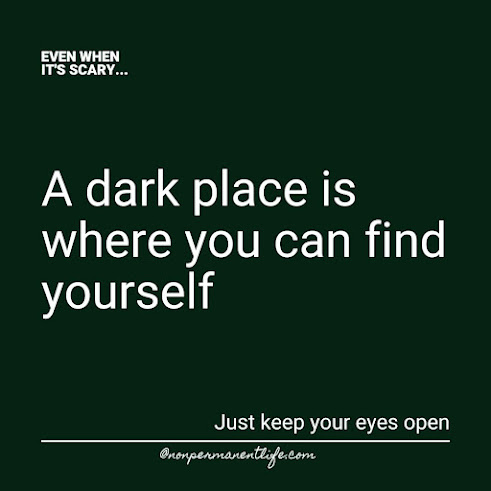Featured
- Get link
- X
- Other Apps
Sorry, I'm Not Sorry
Let's start with this - the real title of this piece is 'Sorry, I'm Not Sorry'.
When you’re motivated by the fear of disappointing others,
you find yourself apologizing for a lot of things that don’t deserve an
apology. "I'm sorry" became one of my go-to automatic responses. I started recognizing this pattern in my communication style at a
young age but always got positive reinforcement when apologizing to others. The
look on someone’s face when they realized that I cared about them enough to put myself in a
vulnerable position to say “I’m sorry” was like a reward – a sweet treat that
filled my soul. It took me 30 years to realize that being inauthentic was a
feeling of disappointment with myself that I could not continue to experience. I
realized that communicating in an authentic way was the greatest of sweet
treats and so began my analysis of why I always found myself saying the automatic phrases like “I’m sorry” when I wasn’t in a position to truly be sorry for anything and how
to communicate in a more authentic way moving forward.
At 34 I am still retraining my brain and regular
communication style to be more true to what I’m feeling in my heart. Science
tells us that the two are directly connected by a highway of vessels and nerves,
but in my experience that does not always correlate to the two being connected
when communicating. Most often, I feel like there’s a massive backup on my
highway that doesn’t allow the two to be in agreement before my mouth starts
moving - the sirens of responding crews drowning out the true message in my heart that I am trying
to evoke - and I always go back to my automatic “I’m sorry”.
“I’m sorry I can’t make it”, “I’m sorry I didn’t respond right away”, “I’m sorry I missed your call”, “I’m sorry I don’t agree”. These were statements I was making at staggering rates a few years ago – and they still slip in today. It hit me that by starting communication this way, I was really saying “I shouldn't have put myself first. My plans/life/workload/to-do list/emotions/wants or needs do not matter. I feel terrible for letting you down,”. I realized that these go-to apologies could easily be made into statements that allowed me to communicate in an honest way. “I missed your call because I took my dogs for a walk”. Because let's face it - I'm not sorry that I missed a call while spending time with my dogs. Taking my furbabies on a walk and leaving my phone at home is not an attack on anyone. I do not think of everyone who could possibly think to call me during the hour I’m away and say ‘fuck them!’. I do not put my phone on the kitchen counter and do a pinky and the brain evil laugh as I walk out the door. There is no malice or ill motive with my action, so there is no need to apologize. It makes sense - so why is it so difficult to cut out the "I'm sorry's"? WHY?!
I was raised to be polite – Say “please”, “thank you”
and “I’m sorry”. I went off the deep end with one of those. It’s not as simple
as that and when my therapist and I work it all out I’ll come back to this
post and provide some revelation.
Although I don’t exactly have the reason figured out for why
I do this, I know it is extremely annoying and distracting to me and I must
alter the way I communicate. While the word vomit in conversation is hard to
stop and impossible to retract, edit and redeliver – I realized that I could
start retraining myself in a communication method where I realized I use my automatic
response often. My work. I am slightly OCD and have a fear of disappointing, so
I always reread emails before sending. I discovered the magic of the ‘delete’
button and the ability to retract my apologies and communicate the truth. IT
HAS BEEN LIFE ALTERING.
This change easily infiltrated my personal emails and text message communication
and slowly I have been realizing great successes in my verbal communication as
well. Let me stress that it has been a VERY slow process to improve my verbal communication. Still very much a work in progress. I
struggle with anxiety when there are pauses or gaps in conversations – I feel the pressure to fill the
pauses and keep communicating even if I’m going back to my automatic responses.
I think that television and movies have shaped a lot of us to feel this way. If
you grew up with entertainment in your daily lives, you were watching scripted,
planned out conversations that weren’t faulted. Every word and reaction perfect. In real life there are stumbles,
WTF moments and emotions involved in communication that you have to decipher in
half a second and then respond to. We all need to cut ourselves a break -- we are not able to yell "LINE" or be coached at a moment's notice of how we are supposed to deliver a perfect response or reaction to others. It is by identifying this reality of everything my brain must do in order to respond, that I have started to understand why I have made up the automatic responses -- it's overwhelming! However, since working on cutting out the auto-responses (especially the "I'm sorry"), I have seen a great improvement and more sense of
enjoyment when I slow down and live in the pause to have more authentic
communication.
While I wish that there was a hammer that could magically
appear to hit me on the head when I slip up and start the “I’m sorry’s” (just
like in the classic cartoon you’re imagining right now), I have found other,
less painful, ways to remind me to communicate authentically.
- I have a post-it note on my desktop in my office that simply says ‘I'm Sorry’ written with a strike-out. It's a nice reminder to not use this statement as a default in communication
- Re-read emails and text messages if you feel yourself in your automatic space and allow yourself the time to edit so that you are authentic in your communication
- If you feel the pang of anxiety when communicating with someone – try your best to live in the pause and appreciate it. Pause. Breathe. Communicate.
- Allow yourself to celebrate authentic communication. No matter the message, if you get a feeling of love, relief, warmth, happiness, etc. feel it and recognize that the feeling is coming from you being completely authentic.
I will continue to do the work to embrace the pause and my
truth. I’m not sorry.
virtual chest bump -





Comments
Post a Comment
We would love to hear your thoughts and questions. We learn best together and find our journey more enjoyable when we have a tribe!